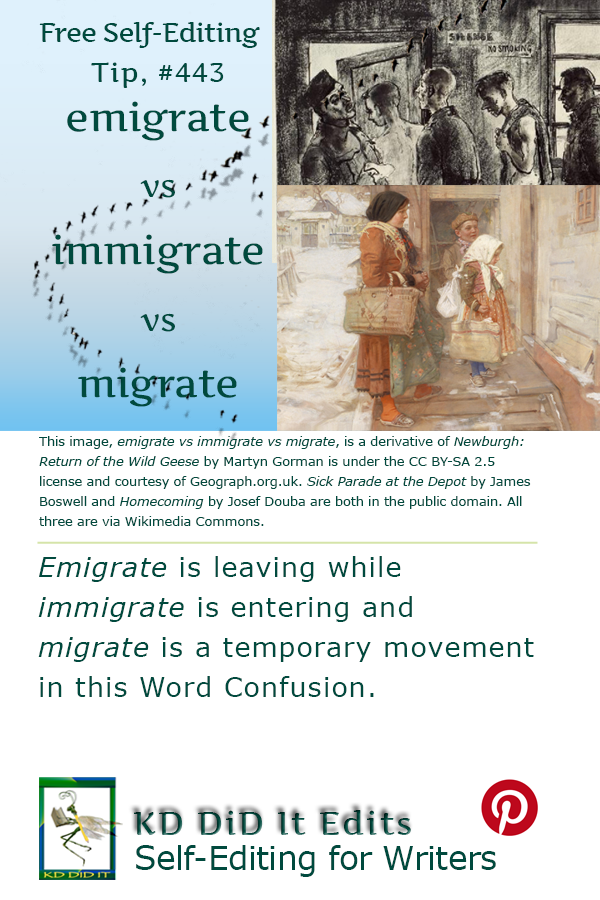Revised as of
4 July 2023
This is one of those confusions I always have to stop and think about: emigrate is to leave, exit while immigrate is to enter, go in.
Then migrate popped up.
The major difference between migrate and emigrate and immigrate is that the former is generally a temporary move dependent upon conditions while the latter two are generally a permanent move.
| One . . . | ||
| emigrates from | OR | immigrates to |
| It’s generally the birds and other animals that . . . | ||
| migrate from place to place temporarily | ||
What can I say? We all have our blind spots. The trick is to spot them!
Word Confusions . . .
. . . started as my way of dealing with a professional frustration with properly spelled words that were out of context in manuscripts I was editing as well as books I was reviewing. It evolved into a sharing of information with y’all. I’m hoping you’ll share with us words that have been a bête noire for you from either end.
If you found this post on “Emigrate vs Immigrate vs Migrate” interesting, consider subscribing to KD Did It, if you’d like to track this post for future updates.
| Emigrate | Immigrate | Migrate |
|---|---|---|

Good Heaven What Sorrows Gloom that Parting Day painting by Thomas Falcon Marshall, 1818–1878, Britain, is in the public domain with details of the artist on Google Art Project, via Wikimedia Commons. — Thomas Falcon Marshall’s painting, |

Ellis Island courtesy of Aude is in the public domain, via Wikimedia Commons. — Landing at Ellis Island, 1902 emigrants coming up the boardwalk from the barge, which has taken them off the steamship company’s docks, and transported them to Ellis Island. |

Zebra Migration, Okavango, Botswana, by Alana Lowes is under the CC BY-SA 4.0 license, via Life Begins At.com.au. — Researchers note the zebras who migrate to the Makgadikgadi Pans. |
| Part of Grammar: | ||
| Verb, intransitive
Third person present verb: emigrates |
Verb, intransitive & transitive
Third person present verb: immigrates |
Verb, intransitive & transitive
Third person present verb: migrates |
| Leave one’s own country in order to settle permanently in another | Verb, intransitive: Come to live permanently in a foreign country To enter a country, intending to remain there To pass or come into a new habitat or place, as an organism Verb, transitive: |
Verb, intransitive: [Of an animal, typically a bird or fish] Move from one region or habitat to another according to the seasons
Move from one part of something to another
[Computing] Change or cause to change from one system to another [Chemistry; of ions] To move toward an electrode during electrolysis
[At British universities] To change or transfer from one college to another Verb, transitive:
[Marketing] To induce customers to shift purchases from one set of a company’s related products to another |
| Examples: | ||
| Rosa’s parents emigrated from Argentina.
My maternal great-great grandparents emigrated from Norway. Many Mexicans emigrate to the US because they can have a better life. |
Verb, intransitive: The Mennonites immigrated to western Canada in the 1870s. After the California Gold Rush, contractors immigrated Chinese laborers to work mines, build railroads, and work on farms. My aunt emigrated from Poland and immigrated to Canada. Verb, transitive: After having visited Norway, I know why Scandinavians immigrated into Minnesota and Wisconsin. |
Verb, intransitive: As autumn arrives, the birds migrate south. Rural populations have migrated to urban areas. Cells that can form pigment migrate beneath the skin. Filarial worms migrate within the human body. Customers are migrating from mainframes to client-server environments. A few of us are hoping to migrate from Balliol to Jesus. Verb, transitive: The system will allow users to migrate applications across environments. They had finished migrating all of the affected code to the production server by 2:00 am, three hours later than expected. We were hoping to migrate the customers of the “C” series to the “E” series and the “E” customers to the “S” series. |
| Derivatives: | ||
| Adjective: emigrative, emigratory, unemigrating Noun: emigrant, emigrating, emigration Verb, intransitive: reemigrate, reemigrated, reemigrating |
Adjective: immigrational, immigratory, unimmigrating Noun: immigrant, immigrating, immigration, immigrator |
Adjective: migratable, migratory, nonmigrating Noun: migrating, migration, migrator, nonmigrating Verb, intransitive: intermigrate, intermigrated, intermigrating, remigrate, remigrated, remigrating |
| History of the Word: | ||
| Late 18th century from the Latin emigrat-, or emigrated, from the verb emigrare, from e-, a variant of ex- (out of) + migrare (migrate). | Early 17th century from the Latin immigrat-, or immigrated, from the verb immigrare, from in- (into) + migrare (migrate). | Early 17th century, in the general sense move from one place to another, from the Latin migrat- meaning moved, shifted, from the verb migrāre. |
C’mon, get it out of your system, bitch, whine, moan . . . which words are your pet peeves? Also, please note that I try to be as accurate as I can, but mistakes happen or I miss something. Email me if you find errors, so I can fix them . . . and we’ll all benefit!
Satisfy your curiosity about other Word Confusions on its homepage or more generally explore the index of self-editing posts. You may also want to explore Book Layout & Formatting Ideas, Formatting Tips, Grammar Explanations, Linguistics, Publishing Tips, the Properly Punctuated, Writing Ideas and Resources, and Working Your Website.
Resources for Emigrate vs Immigrate vs Migrate
Apple Dictionary.com
Dictionary.com: migrate
Merriam-Webster: migrate
WikiDiff migrate
Pinterest Photo Credits:
Newburgh: Return of the Wild Geese by Martyn Gorman is under the CC BY-SA 2.0 license and courtesy of Geograph.org.uk. Sick Parade at the Depot by James Boswell and Homecoming by Josef Douba are both in the public domain. All three are via Wikimedia Commons.


